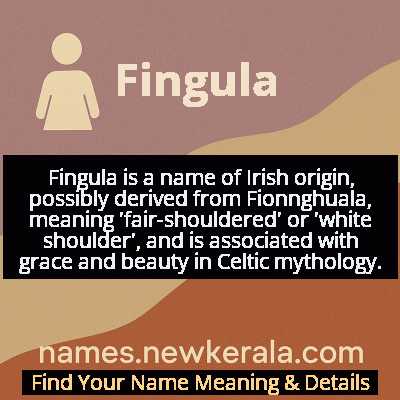Fingula Name Meaning & Details
Origin, Popularity, Numerology Analysis & Name Meaning of Fingula
Discover the origin, meaning, and cultural significance of the name FINGULA. Delve into its historical roots and explore the lasting impact it has had on communities and traditions.
Name
Fingula
Gender
Female
Origin
Celtic
Lucky Number
7
Meaning of the Name - Fingula
Fingula is a name of Irish origin, possibly derived from Fionnghuala, meaning 'fair-shouldered' or 'white shoulder', and is associated with grace and beauty in Celtic mythology.
Fingula - Complete Numerology Analysis
Your Numerology Number
Based on Pythagorean Numerology System
Ruling Planet
Neptune (Ketu)
Positive Nature
Intuitive, analytical, spiritual, and inquisitive.
Negative Traits
Secretive, reserved, aloof, and can be overly critical.
Lucky Colours
Green, yellow.
Lucky Days
Monday.
Lucky Stones
Cat’s eye, moonstone.
Harmony Numbers
1, 5, 6.
Best Suited Professions
Scientists, researchers, spiritual leaders, detectives.
What People Like About You
Depth of knowledge, analytical skills, spirituality.
Famous People Named Fingula
Fingula ingen Lyr
Mythological Figure
Daughter of the sea god Lyr in Irish mythology, mother of the Children of Lir
Fingula of the Tuatha Dé Danann
Celtic Deity
Member of the divine race in Irish mythology, associated with sovereignty and transformation
Fingula MacLir
Literary Character
Featured in modern Celtic revival literature as a symbol of enduring love
Name Variations & International Equivalents
Click on blue names to explore their detailed meanings. Gray names with will be available soon.
Cultural & Historical Significance
The story of Fingula and her children forms one of the Three Sorrows of Storytelling, a cornerstone of Irish literary tradition. Her narrative has been preserved through oral tradition, medieval manuscripts, and modern retellings, serving as a cultural touchstone for themes of endurance, familial love, and the transformative power of suffering. The 900-year transformation of her children into swans represents the Celtic understanding of time as cyclical rather than linear, and the belief in the permeability between human and animal realms. Fingula's legacy continues to influence contemporary Celtic identity, appearing in literature, art, and cultural education as an emblem of Irish resilience and the enduring power of mythological storytelling.
Extended Personality Analysis
Those bearing the name Fingula often exhibit personality traits deeply influenced by their mythological namesake's journey. They typically possess an extraordinary capacity for endurance and resilience, able to withstand prolonged challenges without losing their essential character. This stems from the mythological Fingula's experience of watching her children endure centuries of transformation while maintaining hope and love. Fingulas are often characterized by deep emotional intelligence and strong intuitive abilities, qualities associated with their connection to water symbolism in Celtic tradition.
Their personality often combines creative vision with practical strength, making them both dreamers and anchors for those around them. They tend to be fiercely protective of family and loved ones, with a loyalty that transcends difficult circumstances. Many Fingulas display a quiet wisdom that comes from understanding transformation as a natural part of life's cycle. They often have a strong connection to nature and artistic expression, finding solace and inspiration in creative pursuits. Their adaptability is matched by a core steadfastness, allowing them to navigate change while maintaining their fundamental values and identity. This balance between flexibility and constancy makes them particularly effective in roles requiring both creativity and reliability.
Modern Usage & Popularity
In contemporary naming practices, Fingula remains a rare choice that signals deep cultural connection and appreciation for Celtic heritage. While it doesn't appear on mainstream baby name charts, it maintains a steady presence within Irish-speaking communities and among families actively preserving Gaelic traditions. The name has experienced a modest revival through increased interest in mythological names and Celtic cultural identity movements. Modern usage often favors the Anglicized forms like Fenella or the affectionate shortening Nuala, which have gained more widespread acceptance while preserving the original's essence. The name finds particular resonance among parents seeking unique, meaningful names with strong mythological foundations and cultural significance. Its usage patterns show concentration in Ireland, Scottish Gaelic communities, and among the Celtic diaspora in North America and Australia. Digital platforms and social media communities dedicated to Celtic names have helped maintain Fingula's visibility, ensuring it remains part of the living tradition of Gaelic naming practices rather than fading into historical obscurity.
Symbolic & Spiritual Meanings
Fingula embodies profound symbolic meanings that resonate across multiple dimensions of Celtic spiritual understanding. Primarily, she represents the concept of transformation as both challenge and opportunity—the mythological transformation of her children into swans symbolizes how profound change can preserve essential identity while enabling survival through difficult periods. The swan imagery connects her to symbols of grace, beauty, and loyalty, while the 900-year duration represents the Celtic understanding of time as cyclical and expansive rather than linear. Her connection to water through her father Lyr positions her as a symbol of emotional depth, intuition, and the flowing, adaptable nature of existence. Fingula also embodies the Celtic concept of 'geis' or sacred duty, representing how personal sacrifice and endurance serve higher purposes. The name carries connotations of maternal protection and the unbreakable bonds of family love that transcend physical form and temporal boundaries. Additionally, she symbolizes the preservation of cultural memory and the transmission of wisdom across generations, making her a powerful emblem of cultural continuity and the enduring power of storytelling in maintaining collective identity.

